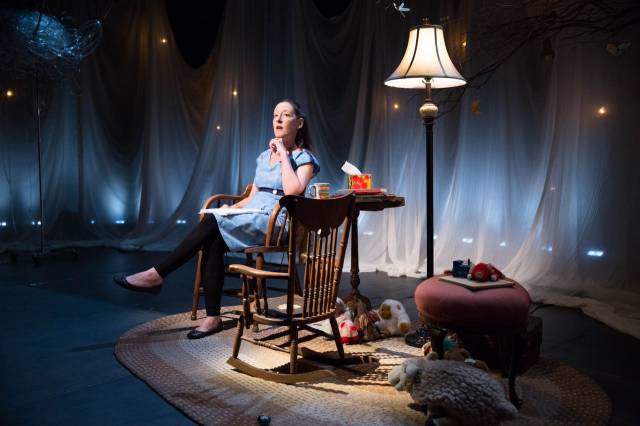

The most frequently heard pronoun in an autobiographical solo show is ‘I.’ The ‘I’ in 8 Stops, one of the two solo shows currently running in rep at the Cherry Lane Theatre, is Deb Margolin, and her complex tale weaves motherhood, cancer, grief, getting older and other themes into a brisk 90 minutes. Time flows freely in the work as Margolin goes from past to present to even further into the past with ease, punctuating each dramatic moment with a punch line and a pause. She is a confident theatre actor, with years of experience in rhythm and diction, and she creates specific characters, voicing a myriad of individuals ranging from the women of Montvale, New Jersey to her own children.
Margolin’s acting prowess elevates the writing, which includes some delightful turns of phrases and narrative threads. Some memorable lines include “is it possible that ambition is an immune response to mortality?” and the heartbreaking phrase uttered in her son’s voice – “it’s just the death thing again.” One of the most affecting moments in the play is delivered as an affirmation. “I’m raising children,” Margolin says, and riffs on her changing sense of what that means in her life. It’s a rousing monologue, evocative and touching, and narrows into the play’s most compelling theme: motherhood.
Writer and performer Margolin has gone to lengths to fortify the ‘I’ of 8 Stops, but there’s another pronoun that’s central to a show’s success – ‘you,’ representing the audience, the critic, the observer. Director Jay Wahl stages the play with just enough fuss to create a world for ‘you.’ Looking at a place simply through a character’s eye can feel narrow, and Wahl assures there’s an added perspective, opening up the possibilities of the work. Sound design by Christopher Colucci and lighting design by Thom Weaver enhance the tonal and mood shifts of the narrative, but it’s the set design by Dara Wishingrad that focuses the audience’s attention on the emotional core of the story and unlocks the tale in unexpected ways. The writing itself doesn’t always keep ‘you’ in mind, and the breadcrumbs strewn through the storyline don’t all serve the story’s central cause. The punch lines could be more effective if left unexplained and some of the stories, especially the one that inspired the title, could be cut entirely. The choice to have Margolin remain on-book through the performance detracts from the tragic moments.
At the end of the play, you might walk out with a clear idea of what the ‘I’ (and arguably ‘eye’) of the work was searching for, but it might take more digging to nail down what was in it for ‘you.’ I thought about it and kept returning to the affirmation -- “I’m raising children” -- and wondered if that’s the focus the creative team holds and the writing is on its way to finding.